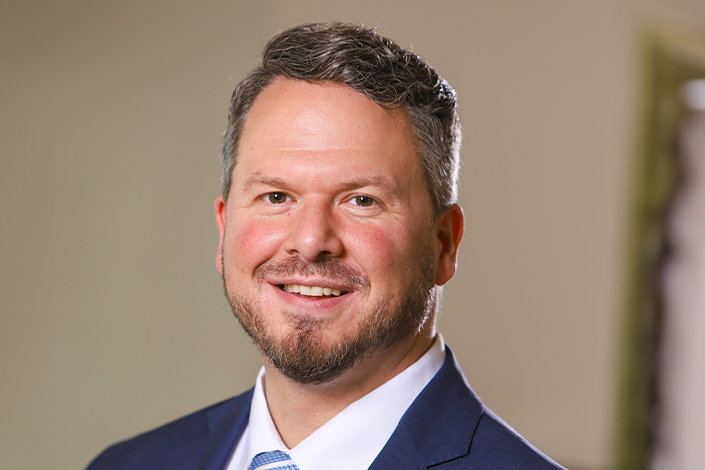A Q&A with Jonathan Board
By Megan Bevins

The West Virginia First Foundation (WVFF) is the initiative dedicated to addressing substance use disorder and the broader public health crisis currently affecting the state of West Virginia. Formed to strategically manage and distribute the settlement funds from litigation against opioid manufacturers and distributors, the WVFF serves as a crucial piece in the fight for combating the ongoing opioid epidemic and fostering recovery and resilience.
The WVFF operates as a nonprofit organization, ensuring the funds are used effectively to benefit the people of West Virginia. Its mission is to distribute these resources to a variety of programs and services that help alleviate the impacts of substance use, improve public health outcomes and strengthen community support.
At the forefront of these efforts stands Jonathan Board, whose experience spans over two decades, during which he has held key roles in state and federal health policy and leadership positions in social services and health care systems. Board was named executive director of the WVFF in March, having previously served on the foundation’s board of directors representing Region 4. His commitment to public service and his intimate understanding of West Virginia’s unique challenges equip him to guide the foundation forward.
WVE:
You were recently named executive director of the WVFF. What does it mean to you to take on this important role?:
JB:
It is one of the greatest privileges of my life to answer the calling of our generation—combatting West Virginia’s substance use disorder and public health crisis. It is our duty not only to those we have lost but to future generations to help this state heal meaningfully.
WVE:
Can you tell us about your background and why your experience makes you the right person to run the WVFF?
JB:
I had the privilege of working for over two decades in state and federal health policy. I served as executive director of Morgantown Community Resources, leading North Central West Virginia’s social services hub. I have also served as a director of public policy for Mon Health System and vice president of external affairs for Vandalia Health and was elected to serve as the Region 4 representative of the WVFF. Above all else, I am a West Virginian, and like all residents of this great state, we are, de facto, part of the solution to this public health crisis. We no longer have the luxury of maintaining the status quo. We must succeed.
WVE:
Can you give some background on the foundation—how it started and what its mission is? Why was it important to establish a foundation specifically
for handling settlement money?
JB:
The foundation was created publicly by the West Virginia Legislature to exist privately as a nonprofit. I applaud the Legislature, the attorney general, the governor’s office and all our county commissions and municipalities that had the foresight to understand that positioning this foundation privately supports doers throughout the state while embracing transparency
and ensuring accountability.
WVE:
How does the foundation plan to seek out new causes to fund? How will the organization adapt its spending to the evolving needs of the opioid epidemic?
JB:
Establishing guiding principles based on best practices and data-driven results will guide our decisions as we disperse funds and assess needs. We look forward to initiating specific criteria and scoring to ensure that all West Virginians have a voice and access to this support.
WVE:
How do you collaborate with other organizations in the state to maximize the impact of the funds?
JB:
Leveraging partnerships is the cornerstone of foundational and nonprofit work. The WVFF will always look for opportunities to strengthen the positioning of the people’s money to ensure the best results.
WVE:
What challenges have you run into and what major successes have you seen so far?
JB:
There are always challenges when standing up a new foundation, especially one that serves the needs of an entire state. Although we are still in our infancy, we look no further than the successful election of a diverse and talented board to demonstrate the desire of all West Virginians for this foundation to succeed.
WVE:
How do you involve the local community in the decision-making process? Does public input or feedback play a role?
JB:
The founding documents of the WVFF contemplate the establishment of an expert panel, both regionally and statewide. These individuals will be selected because of their experience throughout the care continuum and knowledge of their specific communities. They will serve as points of wisdom that the foundation board can rely on in making decisions.
WVE:
Settlement money is being disbursed over the next 10 to 15 years. What long-term goals does the foundation hope to accomplish as that money rolls in? What are the foundation’s plans for sustaining its efforts in combating the opioid epidemic?
JB:
We must protect and grow the corpus of the fund so this foundation can support generational change. It is well
established that West Virginia leads the nation in overdose deaths per capita. Our first task is to substantially reduce that number and begin saving lives. However, we understand that substance use disorder goes well beyond individual challenges. It affects families and communities broadly, from foster care and behavioral health to shelter and food insecurity. Our tasks are broad, and our solutions must be equally broad.
We hold our fiduciary duty paramount in every decision we make, understanding that every dollar the foundation holds is due to the suffering or loss of our friends, families and neighbors throughout the state. As such, we will look for gaps in service throughout the state, identifying sustainable points of care. We understand the moment of awarding support is just the beginning, as we must come alongside caregivers as they promote healing and recovery.








